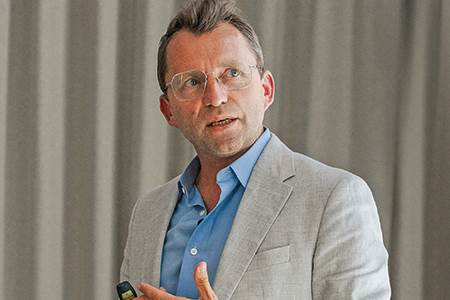“It is time to break existing business models”

For denim industry leader Nicolas Prophte, it is time to update the definition of a successful business by adding responsible metrics to the existing and dominant financial indicators. He also believes that critical and creative thinking should be encouraged and celebrated, and there is reason to be positive: the denim industry has the potential to lead the way.
Time is our most valuable asset as humans. For most of us in the fashion industry, taking time to push pause, reflect and find perspective in our hectic world is becoming a luxury. Our attention and focus are generally absorbed by short-term metrics, calendar milestones or collection deadlines.
The global fashion industry is definitely entering a critical pivot phase which calls for a change in how we conduct business and engage with consumers. The external disruptions we have faced in the last few years have brought to light the weaknesses and cracks that were already undermining the industry’s business model.
Unfortunately, I believe that the cadence of disruptions won’t slow down as we enter an ever-more volatile global environment. Businesses and industries will be challenged by the increased awareness and actions of policy makers. They now realise that it is their responsibility to regulate fashion, both to lower its environmental impacts and to address the social consequences of today’s garment manufacturing industry.
Times are changing, we as brands and the industry, together, have to solve a new complex equation with multiple variables. We still have to design, create and manufacture high quality and trend-setting products that fulfil consumers’ needs. A brand’s competitive advantage, and its brand equity, continue to rely on its ability to design and deliver a desirable product to consumers.
We need to engage high efficiency processes for bulk production to make sure we stay sharp with regards to costs in a very competitive market, in which financial metrics still rule over our everyday business, our supply chain choices and our sourcing strategies. But the equation is now more complex as we must integrate new responsible metrics.
Responsibility, a game changer
The integration of “responsible metrics” in the global business model is a major game changer, as we must serve and support a wider array of key performance indicators (KPIs). It is no longer an open buffet in which we can choose which metrics we choose to prioritise.
For years, we focused exclusively on the aesthetics of a product and completely ignored the raw materials used and the industrial manufacturing processes along with their potentially harmful consequences to the environment and public health.
It is time to be bold and visionary by breaking existing business models, rethinking working methods and shifting the fashion industry’s culture. This change relies on people’s mindsets, beliefs, vision, habits, behaviours, and knowledge.
The question we need to ask ourselves is how do we create the conditions for change in our industry and how do we kickstart a global movement in which the focus is on solving this new complex equation. Neither a single brand nor supplier will have the expertise or the power and weight to disrupt the status quo.
Multiple conditions for change
The conditions for change span all levels of the industry. Corporate responsibility cannot be a side activity working in a silo disconnected from the reality of the supply chain. This requires a new strategic and holistic approach to business, instead of today’s reactive mode to growing pressure from policy makers. To drive their operations in the long term, brands must implement practical roadmaps with their suppliers and identify clear focus areas.
Sadly, many corporate strategies do not go beyond the stage of a presentation slide. Their execution in the real world is low and has virtually no impact on the supply chain. It is essential to develop sound procedures, tools and measurements to track progress toward specific, quantitative and qualitative goals. To guide the roadmaps and ensure that corrective actions are effective, supplier engagement is becoming a field of expertise in itself. The key performance indicators for all suppliers should include responsible and business metrics in a single dashboard.
Education and knowledge will be essential for brands and the industry to develop and acquire new skills to keep abreast of increasingly complex issues. I believe socialising and creating awareness internally on strategic topics related to sustainability are also key to mobilise resources and engage in true change.
This in turn calls for a cultural and organisational shift. Critical and creative thinking should be encouraged and celebrated. It is time to update the definition of a successful business to include not only financial metrics, but also social and environmental achievements that a company’s employees can be proud of. The classic corporate structure, with its hulking hierarchy, will not be able to adapt to the pace of change.
A collaborative mindset on strategic initiatives is another condition for change. Precompetitive agreements should be the rule when brands engage in developing circularity, take back systems, or any large-scale sustainability initiative. Scale is one of the keys to unlock and accelerate the transformation of the industry. This requires that all stakeholders agree on the definition of a ‘responsible framework’. There is too much dispersion, too many initiatives that dilute the power of leverage and create distraction. Efforts need to be better coordinated between brands, suppliers, policy makers, NGOs and R&D centres. Each has a specific role to play to ensure that policy makers implement the measures that lead to better practices and investment in innovation.
Despite the challenges we face and the disruptions we will experience in the future, we must also remain optimistic and recognise the incredible opportunity we have at hand to make the necessary changes in our industry. I personally find this situation extremely exciting, and it drives me in my everyday work. Fall in love with the problems first, and then we can collectively find the solutions. The denim industry has the potential to lead the way towards more responsible business practices and serve as an example for the broader fashion industry.
A recognised leader in promoting a more responsible business culture, Nicolas Prophte is an experienced sourcing and supply chain strategist and his guest comment for Inside Denim expresses his own personal views. An engineer in textile chemistry, he began his career at French sports retailer Decathlon before working for leading denim brands, from Pepe Jeans to PVH. He is based in Amsterdam.
Photo: Nicolas Prophte












